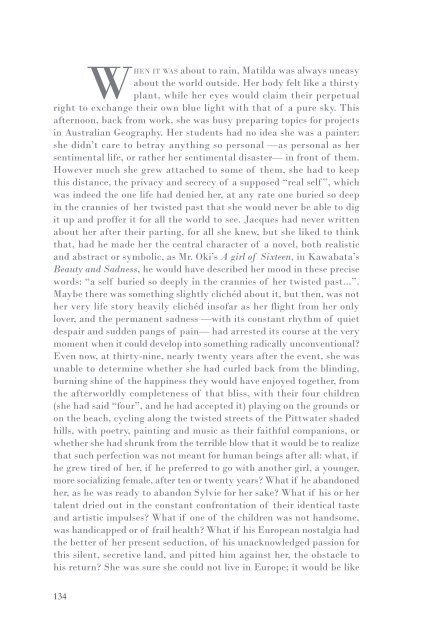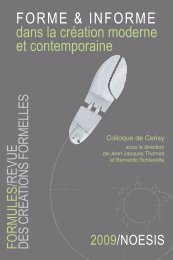You also want an ePaper? Increase the reach of your titles
YUMPU automatically turns print PDFs into web optimized ePapers that Google loves.
WHEN IT WAS about to rain, Matilda was always uneasy<br />
about the world outside. Her body felt like a thirsty<br />
plant, whi<strong>le</strong> her eyes would claim their perpetual<br />
right to exchange their own blue light with that of a pure sky. This<br />
afternoon, back from work, she was busy preparing topics for projects<br />
in Australian Geography. Her students had no idea she was a painter:<br />
she didn’t care to betray anything so personal —as personal as her<br />
sentimental life, or rather her sentimental disaster— in front of them.<br />
However much she grew attached to some of them, she had to keep<br />
this distance, the privacy and secrecy of a supposed “real self ”, which<br />
was indeed the one life had denied her, at any rate one buried so deep<br />
in the crannies of her twisted past that she would never be ab<strong>le</strong> to dig<br />
it up and proffer it for all the world to see. Jacques had never written<br />
about her after their parting, for all she knew, but she liked to think<br />
that, had he made her the central character of a novel, both realistic<br />
and abstract or symbolic, as Mr. Oki’s A girl of Sixteen, in Kawabata’s<br />
Beauty and Sadness, he would have described her mood in these precise<br />
words: “a self buried so deeply in the crannies of her twisted past...”.<br />
Maybe there was something slightly clichéd about it, but then, was not<br />
her very life story heavily clichéd insofar as her flight from her only<br />
lover, and the permanent sadness —with its constant rhythm of quiet<br />
despair and sudden pangs of pain— had arrested its course at the very<br />
moment when it could develop into something radically unconventional?<br />
Even now, at thirty-nine, nearly twenty years after the event, she was<br />
unab<strong>le</strong> to determine whether she had cur<strong>le</strong>d back from the blinding,<br />
burning shine of the happiness they would have enjoyed together, from<br />
the afterworldly comp<strong>le</strong>teness of that bliss, with their four children<br />
(she had said “four”, and he had accepted it) playing on the grounds or<br />
on the beach, cycling along the twisted streets of the Pittwater shaded<br />
hills, with poetry, painting and music as their faithful companions, or<br />
whether she had shrunk from the terrib<strong>le</strong> blow that it would be to realize<br />
that such perfection was not meant for human beings after all: what, if<br />
he grew tired of her, if he preferred to go with another girl, a younger,<br />
more socializing fema<strong>le</strong>, after ten or twenty years? What if he abandoned<br />
her, as he was ready to abandon Sylvie for her sake? What if his or her<br />
ta<strong>le</strong>nt dried out in the constant confrontation of their identical taste<br />
and artistic impulses? What if one of the children was not handsome,<br />
was handicapped or of frail health? What if his European nostalgia had<br />
the better of her present seduction, of his unacknow<strong>le</strong>dged passion for<br />
this si<strong>le</strong>nt, secretive land, and pitted him against her, the obstac<strong>le</strong> to<br />
his return? She was sure she could not live in Europe; it would be like<br />
134







